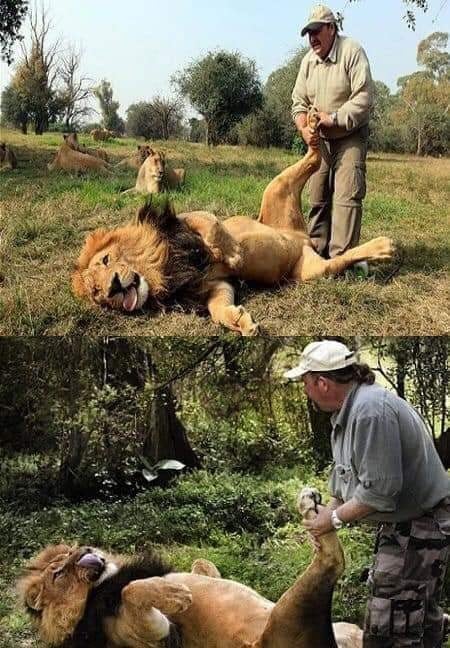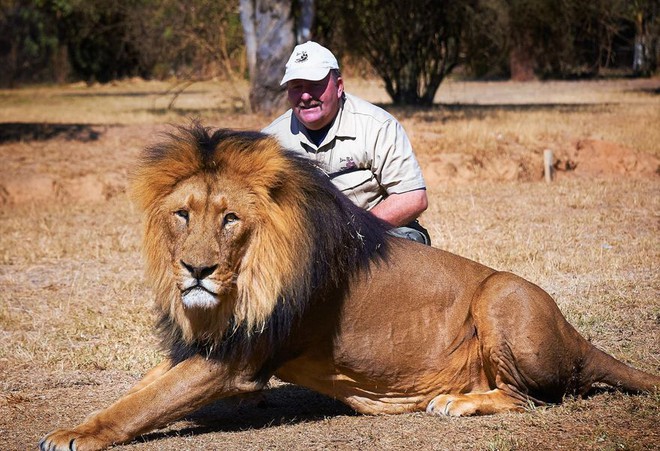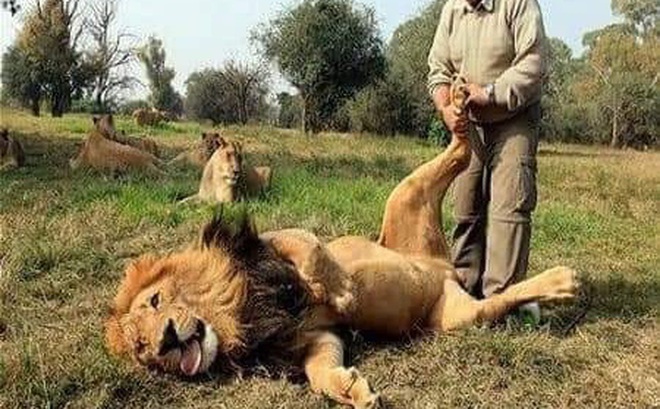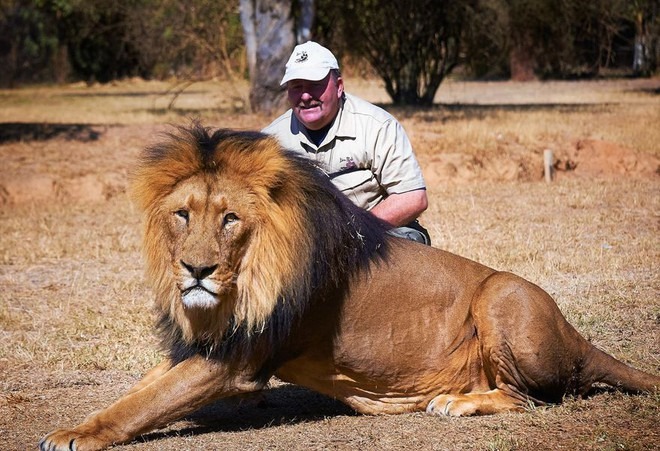A Friendship Born in the Wild
In the golden plains of South Africa, where the wind moves softly through tall grass and the sunsets paint the sky in fire, one man’s story has captivated the world. It’s a story not of fear, but of friendship — a story about a British man named Alex Larenty and his extraordinary bond with a pride of lions.
While most people think of lions as majestic but untouchable predators, Alex sees them differently. To him, they are sentient, emotional beings — capable of trust, affection, and even what appears to be joy. What began as a simple act of care slowly evolved into a connection that challenged everything people thought they knew about the relationship between humans and the wild.

The Beginning of an Unlikely Journey
Alex’s path to South Africa wasn’t one of luxury or fame; it began with a deep love for animals. As a young man, he volunteered at an animal reserve, helping care for various species. It was there that he encountered lions for the first time — not behind fences or through glass, but up close, face to face.
He was captivated not only by their power but by their quiet intelligence and emotional depth. Observing them for hours each day, Alex began to understand that lions were far more than symbols of strength. They were complex beings with moods, preferences, and a language of expression few humans had ever tried to learn.
The Healing Touch
One afternoon, a lion at the reserve developed a mild infection on its leg. Alex was tasked with applying a soothing cream to aid in its recovery. It was a delicate task — one that required immense patience and calm. He spoke softly as he worked, gently rubbing the ointment into the lion’s fur.
At first, the lion remained still, wary but trusting enough to allow the contact. Then something unexpected happened. The great cat shivered — not in fear, but in what looked like contentment. As Alex continued, the lion’s expression softened. Its mouth curved upward in what could only be described as a smile.
That single moment changed Alex’s life. He had touched not just the lion’s body, but its trust. From that day onward, Alex introduced daily massage sessions into his care routine. It wasn’t about training or control — it was about comfort and connection.

When Lions Learn to Trust
Over the following weeks, Alex’s gentle approach became a familiar ritual. As he entered the enclosure, the lions would recognize his scent and his voice. Some would lie down before he even reached them, stretching out their legs as if ready for their daily massage.
What astonished observers most was how the lions responded. They didn’t display the aggression typically associated with territorial animals. Instead, they relaxed, purring softly or closing their eyes as Alex worked. In some moments, their faces would form those same curious “smiles” — expressions that spoke of calmness and affection.
To Alex, this was proof that animals respond to genuine care. They may not smile the way humans do, but they experience comfort, trust, and emotional connection in ways science is only beginning to understand.
Beyond the Physical: The Emotional Connection
It became clear that Alex’s work was more than physical therapy. It was emotional enrichment. Each lion had its own personality — some playful, others reserved — and Alex adjusted his approach accordingly. Over time, they sought him out, greeting him with familiarity and calm.
The bond that grew between them wasn’t about dominance or submission. It was mutual respect. Alex treated the lions as equals in spirit — not as pets or spectacles, but as sentient beings worthy of dignity. And they responded in kind, offering trust that few humans had ever earned.
Even the cubs began mimicking the adults, padding toward Alex with playful curiosity. Their mothers allowed the interaction — a remarkable gesture in itself, given how protective lionesses are.

The Science Behind the Bond
While stories like Alex’s sound almost mythical, modern science offers clues that help explain these connections. Animal behaviorists and zoologists have long studied the effects of positive human interaction on large mammals.
Research suggests that animals, including predators like lions, can recognize individual humans and remember interactions that evoke calm or care. Oxytocin — often called the “bonding hormone” — plays a role in trust and affection in both humans and animals. Studies with dogs, horses, and even wild elephants have shown that gentle physical touch can lower stress hormone levels and foster relaxation.
Alex’s massages likely produce similar physiological effects. The rhythmic, soothing contact could stimulate the lions’ sense of comfort, reduce tension, and create associations between human presence and safety. What appears to be a “smile” may in fact be a facial relaxation pattern — though, as Alex himself often says, it’s hard not to believe they’re smiling back.
A Cultural Symbol of Harmony
Throughout history, lions have symbolized strength, courage, and leadership. In many African cultures, they represent balance — the power of nature tempered by wisdom. The ancient Egyptians revered lions as protectors, while in Christian and Hindu traditions, they often embody divine guardianship.
What makes Alex’s story so compelling is how it redefines this ancient symbolism. His gentle interactions reveal another layer of the lion’s character — compassion. In his care, the lion is no longer just a symbol of ferocity but a reminder that strength and gentleness can coexist.
This shift in perspective reflects a broader cultural movement toward empathy and coexistence with the natural world. In an age where conservation often focuses on numbers and territories, Alex’s story reminds people that emotional relationships are just as vital to the well-being of animals in human care.

Respecting Nature, Not Taming It
Despite their affection, Alex never forgets that lions are wild animals deserving of respect. He often emphasizes that his relationship with them is built on understanding, not control. “They don’t belong to me,” he once said. “I’m just lucky they let me be part of their world.”
That humility defines his philosophy. His work is not about domesticating the wild, but about bridging the gap between two species — learning from one another in a safe, respectful space.
Scientists and wildlife experts often stress that such relationships, while inspiring, are rare and should never encourage casual human interaction with wild predators. Alex’s bond with the lions is the product of years of observation, patience, and professional care — not something to be replicated lightly.
Lessons from the Lions
What Alex’s story truly offers is a lesson in empathy. His gentle approach demonstrates that communication with animals doesn’t always require words — sometimes it just requires presence, patience, and respect.
When the lions “smile,” whether through scientific or emotional interpretation, the meaning remains profound. It’s a symbol of trust earned through kindness. It shows that even the most powerful beings respond to compassion.
In a world where humans and wildlife often find themselves in conflict, stories like Alex’s remind us that coexistence is possible — not through domination, but through understanding.
Bridging Myth and Modern Science
There’s something almost mythical about a man massaging lions and earning their smiles. It echoes ancient legends — from African shamans who spoke of spiritual connections with animals to the classical myth of Androcles, who removed a thorn from a lion’s paw and was later spared by it.
Science, meanwhile, offers rational explanations rooted in behavior and biology. Both perspectives, though different, point to the same truth: humans and animals share emotional common ground.
Whether one views Alex’s story through the lens of mythology or ethology, it carries the same message — that kindness transcends species.
A Glimpse of Shared Humanity
Perhaps what draws people to Alex’s story is how it reflects something deeply human. When a lion relaxes under his touch, it’s as if the barriers between worlds momentarily disappear. For a brief instant, the wild and the human coexist in harmony.
Those watching such moments often describe a feeling of peace — a realization that nature responds to empathy in ways we’re only beginning to understand.
The smiles of the lions, captured in countless photographs, have become a global symbol of this harmony. They remind us that joy exists not only in human connection but in every living bond we choose to nurture.

Reflection: What the Lions Teach Us About Ourselves
In the quiet of the African reserve, when the sun dips below the horizon and the world turns gold, Alex often sits among the lions he calls his friends. Their gentle purrs fill the air like a low hum — the sound of trust, of life shared across difference.
What began as an act of care became a bridge between species. His story invites us to look closer at how we interact with the natural world. Do we approach it with fear, or with respect? Do we see wildness as something to conquer, or something to learn from?
Alex’s experience reminds us that kindness is a universal language. Whether through science or spirit, the truth remains: connection is possible when we treat others — human or animal — with patience and empathy.
And perhaps that’s the greatest lesson of all. The lions’ smiles are more than facial expressions; they’re reflections of the harmony that can exist when we choose understanding over fear.
In the end, Alex’s story isn’t just about lions — it’s about us. It’s about rediscovering the gentleness within strength, the compassion within power, and the beauty of seeing the wild not as something distant, but as something we are a part of.
Sources
-
stories.feji.io — “From Healing Touch to Smiles: The Bond Between Alex Larenty and Lions”
-
National Geographic – “The Science of Animal Emotions”
-
BBC Earth – “Why Wild Animals Form Unusual Bonds”
-
Smithsonian Magazine – “The Oxytocin Connection: How Humans and Animals Build Trust”
-
African Wildlife Foundation – “Understanding Lions: Behavior and Conservation”
